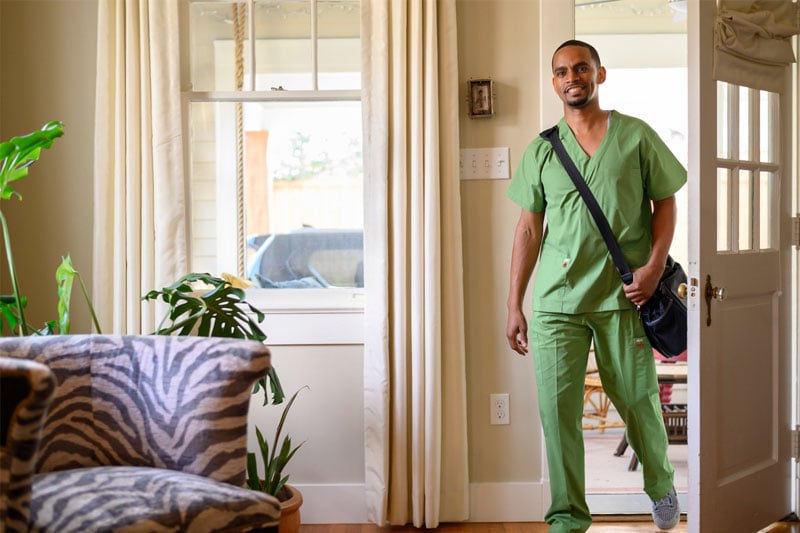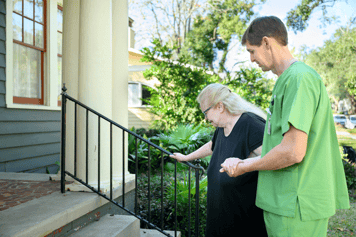When patients are readmitted to the hospital within a short period of time, for the same health concerns, it raises questions. Did they receive proper quality care or were they discharged at the right time? If not, the readmission may have been preventable.
The National Library of Medicine estimates that potentially avoidable readmissions have an annual cost reaching $41.3 billion for patients readmitted within 30 days after discharge, making it one of the costliest episodes to treat in the United States.
[action 1]
Reducing Readmissions with Home Health
When patients return home after an acute episode, they are often not fully equipped to care for themselves, or they require therapy and/or nursing care to fully complete their recovery. For eligible patients, home health is an opportunity to lower costs, improve clinical outcomes and reduce the likelihood of returning to the hospital.
In a study published in the American Journal of Managed Care, researchers looked at patients who experienced discharges to home health care under the post-acute care transfer policy. Data was gathered on Humana Medicare Advantage members from claim submissions, CMS mortality data, enrollment files, primary care contracts and program participation documents.
Out of 19,231 patients included in the study, 4,160 received discharge to home health care, while 15,071 had a discharge to home. Patients who received home health care had a 60 percent lower risk of readmission after 30 days. Researchers also found that hospital spending for the home health care group was $239 less per patient.
Effective home care begins with understanding the whole person and not just their specific condition. Our care team dives deeper into underlying medical conditions, diet, age, current medications, mobility, family involvement and other factors to create a plan to heal and further reduce readmissions.
Examples of how Amedisys approaches certain home health conditions:
Wound Care
There is more involved in wound care management than simply changing bandages and dressings. Studies have proven that wound patients feel more secure and less psychologically stressed when receiving care in a familiar environment, which promotes wound healing and overall recovery. Our goals for at-home wound care include:
- Empowering patients and their caregivers to properly care for wounds and take prescriptions
- Using molecular wound testing for timely identification of organisms that are impending healing
- Addressing pain and preventing infection
- Providing a multidisciplinary approach to wound healing therapy, medical social workers and registered dieticians.
- Promoting a healthy diet and educating on its effect on healing
- Monitoring overall safety of living conditions
- Using subject matter experts to provide consultation on complex, high acuity patients.
- Staying ahead of future problems that may arise and prevent new wounds
Fall, Dizziness or Loss of Balance
Our fall reduction program involves both the patient and their caregivers due to minimized abilities to perform activities of daily living such as walking and impaired cognitive abilities. Falls negatively impact outcome measures and increase healthcare costs by increasing ED visits and hospital readmissions. In fact, emergency departments recorded 3 million visits for older adult falls in 2020.
In 2013, medical costs related to falls reached nearly $34 billion, making effective fall-risk management in the home more important. Home health patients can receive a VRI lifeline button for free and once discharged the VRI is offered to patients at a discounted cost.
Heart Failure
Heart failure hospitalizations have the highest 30-day all-cause readmission rates and the largest estimated total cost among Medicare beneficiaries. Home health provides medical care that eligible heart failure patients need to recover by monitoring early warning signs, lowering anxiety and working one-on-one to teach self-care behaviors for managing heart conditions.
COPD
Home health for COPD helps you recognize when your symptoms get worse and know what steps to take. Some goals of the Amedisys COPD program include:
- Slow the progression of COPD
- Improve ability to stay active
- Help you become as independent as possible
- Make sure your home environment is as safe as possible
- Improve your quality of life and overall health
Medication Management
At least 15% of seniors seeking care annually from doctors or hospitals have suffered a medication problem. Too often, patients don’t understand how to follow through with directions when managing medications at home. This is especially true in patients with complex medication regimens or multiple medications. Our at-home care specialists support patients in tracking and taking prescribed medications as ordered – helping to safeguard quality outcomes and avoid unnecessary rehospitalizations. Specifically, we can help:
- Provide education, tools and monitoring to help patients take medications as prescribed.
- Assist in communication and collaboration between you, your patient, and other healthcare providers.
- Establish easy-to-follow practices for patients and caregivers to better manage their own medications.
- Monitor patients for drug interactions and negative side effects.
- Help patients keep an up-to-date record of their medications, over-the-counter drugs and supplements to share with all their health care providers.
- Identify barriers to medication Adherence– including vision and dexterity, cognitive or financial issues – and provide treatment and resources as
What is the Hospital Readmissions Reduction Program?
To minimize the negative impact of high readmission rates, the Hospital Readmission Reduction Program (HRRP) was developed by the Centers for Medicare & Medicaid Services (CMS). The program encourages hospitals to improve communication and care coordination to engage patients and caregivers in discharge plans to reduce avoidable readmissions.
The 30-day readmission rule is a provision of the Affordable Care Act that requires hospitals to reduce payments by up to 3 percent per readmission occurring within 30 days of discharge. The risk of penalties is meant to incentivize hospitals to improve their quality of care.
However, not all readmissions are penalized. Under the HRRP, Medicare only looks at readmissions that happen after an initial admission for the following medical conditions:
- Acute myocardial infarction
- Heart failure
- Pneumonia
- Chronic obstructive pulmonary disease (COPD)
- Total hip replacement
- Total knee replacement
- Coronary artery bypass grafting
Amedisys’ Interdisciplinary Approach
At Amedisys, our interdisciplinary home health team consists of registered skilled nurses, psychiatric nurses in certain markets, home health aides, social workers, speech therapists, occupational therapists and physical therapists. We can identify concerns and help prevent exacerbations that lead to unnecessary hospitalization or readmission.
Our success is measured by the success of our patients. That’s why we provide quality care and preventative measures that keep readmission rates down and your patients where they are most comfortable – their home.
Here are some ways we provide quality care and help keep readmissions down:
Leveraging Technology
Keep track of all your patients quickly and easily with Provider Link, our free web-based program. This patient management system enables you and your staff to collaborate more efficiently with our clinicians regarding your patient’s plan of care. It has been called a “practical and easy-to-use system” by physicians. The benefits of Provider Link include:
- Medication profiles for a complete picture of your patient’s medications, allergies, current and past prescriptions, and non-prescribed medications.
- Patient reports for all patients, whether active or discharged.
- Graphed trends and vital signs.
- Wound care status updates and photos.
- Complete Face-to-Face documentation.
- Ability to create referrals electronically.
- Allows physicians to sign orders electronically.
24/7 Access
Our nurses are on stand-by 24/7. This means greater peace of mind for you, your patients and their families, and fewer after-hour calls to your office.
Patient Empowerment and Engagement
Our programs feature personalized patient goals, caregiver integration and comprehensive patient education self-care workbooks to get patients engaged in their own self-care.
Refer your eligible patients to home health today and take the first step in reducing hospital readmissions.





